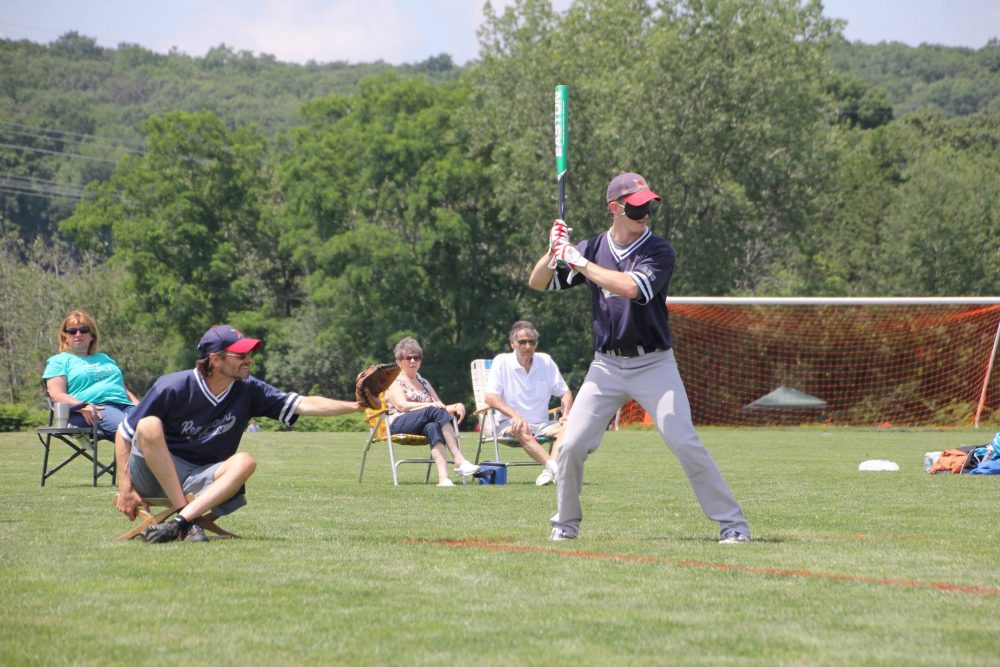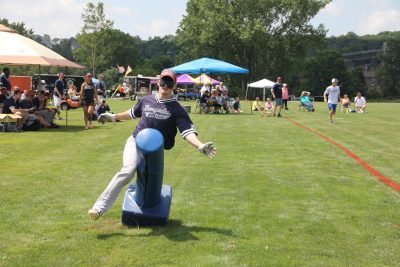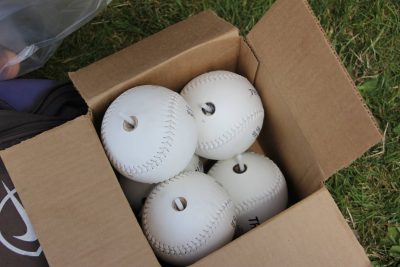Advertisement
Ballplayer Gets Back In Batter's Box With Beep Baseball

As far back as Christian Thaxton can remember, he’s had a baseball bat in his hands.
"I like to joke that I was swinging before I was walking, basically, right?" Christian laughs.
Christian grew up playing baseball in his Oklahoma backyard with his brothers. He played in high school and at Redlands Community College in El Reno, Oklahoma. As a freshman, he worked his way into the lineup as the starting designated hitter. Things were going well for Christian, until April of 2013.
"I always crushed the inside pitch. That was the pitch I turned on," he says. "And I started just losing it halfway to the plate. So, I’d start swinging, and it would just disappear and just totally throw me off."
All hitters go through slumps. But then ...
"I started noticing, kind of, a dark spot in my eye," Christian says. "At that point I was, like, 'OK, something’s definitely going on here.'"
Christian consulted a neuro-ophthalmologist who told him he had a viral infection, and that the dark spot in his right eye would go away.
"I was still driving. I was still in school. I could do everything. I was still a sighted person," Christian says. "And so I was, like, 'Oh, give it a couple months.' A couple months later, it hadn’t cleared up. It had actually gotten larger. Now there’s a spot in my left eye. It’s, like, 'What’s going on?'"
'What Do You Mean I'm Going Blind?'
On Oct. 15th, 2013, Christian drove to his doctor’s office. He was diagnosed with Leber’s Optic Neuropathy, which typically affects men in their late teens. The doctor told him that he’d soon lose most of his vision and that the loss would most likely be permanent.
"I was just taken aback. I was floored," Christian says. "It was just, 'What do you mean, I’m going blind?'"
Christian got back into his car and drove home for what would be the last time in his life.
"And I just collapsed on my bed," he says. "I just broke down and started crying, because I just had no idea what going blind would be like. And all these things were racing through my head. How I’d never play sports again. How, you know, what does this mean for school?"
"And you were how old on that day?" I ask.
"It would have been my 20th birthday."
Advertisement

Christian withdrew from his classes at Redlands and moved back with his family. Most mornings, he wasn’t motivated to get out of bed. He struggled to use his computer and smartphone. He rarely left the house, not even to go to his brothers’ baseball games.
"Because there was this very real loss I had experienced," he says. "This is something I can’t do anymore. This huge part of my life is no longer there."
Christian and his parents considered his next step. Maybe low-vision skills training in Louisiana, or near home in Oklahoma. But he was looking elsewhere.
"I always had these high expectations and hopes and dreams for my own life of what I would be, what I would accomplish," he says.
Learning And Relearning
Christian felt staying in Oklahoma would be the safe move. So he decided to enroll in a 16-week program at the Carroll Center for the Blind, located in the Boston suburb of Newton.
In the winter of 2015, Christian headed east.
"It was a nightmare getting out here," he says. "Because it was during that huge snowstorm in 2015, toward the end of it.
"My mom dropped me off at the airport. She saw me get on the plane and then left."
That first flight was delayed by five hours. And then it got worse.
"And that entire time, I was totally by myself," he says. "So, first time flying, new to blindness and I’m stuck in airports for about 12 hours that day. So, it was an interesting first hurdle to get out here."
When he arrived at the Carroll Center, Christian began learning braille and relearning how to cook and clean.
"It was really an eye-opening experience that first day there," Christian says, "just hearing what these different people did for careers, and how they went through college, and what they’re doing now with their lives."
Christian says that baseball was the last thing on his mind. But then he met members of the Boston Renegades. They play a sport called beep baseball.
'I Got To Hit A Moving Ball Again'
"I was, like, 'Oh, that’s cool.' I had never heard of it before," Christian says. "But I was, like, 'You know, this sounds like a really great opportunity, a really great experience. I’m gonna go try this out. See what it’s about.'"
I went to a recent Renegades practice, and here’s what I saw: Each team has members with varying degrees of vision loss, along with its own sighted pitcher and a sighted catcher who sets the target where a batter is accustomed to swing. The pitcher’s goal is to place the ball on the hitter’s bat.

And the balls beep.
After making contact, a batter runs to a buzzing, 4 foot high padded base.
Bases are located 10 feet off of each foul line to keep runners and fielders from colliding. In the field, sighted spotters helped direct fielders toward beeping balls and away from each other.
When Christian first tried out for the Renegades, he had no idea what to expect. But he knew what he wanted to do.
"A ball coming off the bat was one of my favorite feelings, when you just connect with one and it just shoots off the bat," he says. "And so I get up there and I swing, and the first pitch I hit again. And the best way I can describe it is a dream come true. I got to hit a moving ball again."
And he got much more than that.
"You know, I grew up in sports. And this is the closest-knit team that I’ve played on," Christian says. "All of a sudden you’re thrown in with 15 other blind people to help explore what was going on in my life. To have that is amazing. And so you’re gaining much more than just this competitive game. You’re gaining friends, and a family of sorts."
Christian’s new "family" includes an accessibility program coordinator for Boston’s public transit system. There’s also a physical education instructor and a man who recently graduated from Harvard with a Ph.D. in Theoretical Particle Physics. He says they’re all teaching him how to live with blindness.
In July, the men and women of the Renegades traveled to Florida for the Beep Baseball World Series. They came in fifth out of a 22-team field. I ask Christian how he did.
"I had a fair amount of success throughout the World Series," he says.
That’s an understatement. Even though his team didn’t come out on top, Christian was the Series MVP. He batted a ridiculous .897 over seven games, breaking a record that had stood for 21 years. He’s modest, too.
"I need to work on my defense," he says.
... And on his education. He has one semester left at the University of Massachusetts Boston to earn his degree in information systems. In December, he’ll begin searching for a job in project management or business analytics.
Just four years ago, Christian Thaxton hadn’t seen much beyond the well-worn base paths of an Oklahoma ballfield. Just two years ago, he was struggling to come to terms with blindness. And now?
"While I would take my vision back without a second thought, it’s just been a huge positive transformation in my life," Christian says. "One that, while I was going through it, I never, never saw coming. You know, one of the worst things that’s ever happened to me has made me a better person, and I think I’m going to be better off for having gone through it."
This segment aired on August 10, 2017.
